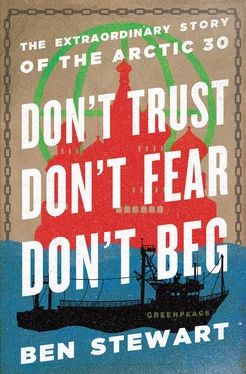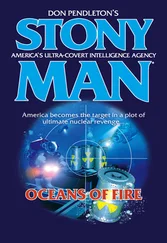[later…] Was just taken across the yard to the Director of prison’s office. The Director went on about tapping and Morse code between prisoners (ours) which I dismissed out of hand, mentioning no one had used such code since passing maritime college 20 yrs ago. On reflection I think he may have been referring to Postman Pat and his black and white cat [the road] during the quiet hours. I’m sure it’s common knowledge.
For the first week Sini Saarela, the Finnish climber who scaled the side of the oil rig, has lived almost entirely on bread. As a vegan she can eat none of the meals she’s served through the hatch in her cell door, and the prison authorities are refusing to give her food she can eat. The guards say it’s her problem if she doesn’t want to eat meat or cheese. Sini’s lawyer fights them hard on it and eventually they relent. Now every mealtime she gets three big cold boiled potatoes, one carrot and one slice of beetroot.
At first she’s grateful, but soon she has to start throwing potatoes away. There are too many of them. She tries to eat all the potatoes but they’re huge. Nine big cold potatoes every day. She gets through four, maybe five, but the rest pile up in her waste bin.
One night Popov, the prison governor, bursts into her cell to conduct an inspection. Immediately the governor spots the potatoes in her bin. His face contorts and he starts shouting at Sini, pointing at the waste bin and screaming in Russian.
‘I’m sorry,’ says Sini. ‘I don’t understand you.’
Popov comes closer so the tip of his nose is nearly touching Sini’s face. Specks of spittle are flying from his lips and spattering Sini’s cheeks as he screams at her. His face is red. Thick green veins are standing out on his temples. He’s standing on his toes to compensate for his short stature. Then he falls silent, screws up his mouth, looks her up and down and storms out.
Sini knows what he was saying. It was about the food in the waste bin. He was so angry. She sits on the edge of her bunk, shaken.
Popov doesn’t usually make the cell checks so she thinks she probably won’t see him again for a while. But the next morning the door swings open and Popov is standing in front of her, and a moment later he’s pointing at the potatoes in the bin and screaming. Sini has never seen anyone so angry. Popov is shaking. He comes close to her, maybe twenty centimetres from her face, shouting and pointing at the waste bin, his moustache twisting and jumping. He’s furious. Sini’s terrified. She can’t understand what he’s saying, but she thinks he’s threatening to throw her in the punishment cell.
Popov exhausts his fury and leaves. A shaken Sini sits on her bed and contemplates what has just happened. She can’t eat all the food, it’s impossible, the guards are delivering industrial quantities of potatoes and bread and almost nothing else. She looks around the cell then jumps up. She gathers all of the bread and takes it to the window. It doesn’t open but there’s a little hole for ventilation that opens sideways, enough space for a bird to poke its beak through. Sometimes the pigeons come into the space between the window and the bars so Sini crumbles the bread and leaves it there and watches the pigeons eating it. Okay, good, she can get rid of the bread. Then she grabs the bin, reaches in, pulls out a potato and drops it into the gap behind the bars. But the cold potato, this huge white hard potato, this potato that was boiled a week ago and kept in a fridge, is left untouched by the pigeons of Murmansk.
Frank Hewetson’s diary
5th October Saturday
Another big sleep. I managed to filter out the wall banging, pipe tapping and shouting thru window. I’m only in touch with [Dutch chief engineer] Mannes now. He is in 410 and I’m in 320. Previously 305. Had a brief chat with Anthony over the wall. They all heard about the hospital trip and were a bit concerned. He reckons he has lost 9 kilos. Roman says he’s lost even more. I get the impression weekends are slower in jail.
While Sini is trying to smuggle food out of her cell, Fabien Rondal – the leader of the ground team in Murmansk – is trying to smuggle letters in.
The rules of SIZO-1 dictate that letters to the prisoners must be posted to the jail and read by a censor before being given to the activists. Letters and packages posted from abroad take weeks to arrive in prisoners’ cells, and even then the contents have been searched, sliced, scribbled on and blacked out. Rondal makes it a priority to short-circuit the system and open a communication channel between SIZO-1 and the outside world.
It seems impossible, but if anybody can do it, it’s the 38-year-old Belgian. He comes from a family of opera fanatics, his brother is a professional singer, but Rondal’s only brush with music was as a roadie for rock bands. He might once have had boy-band good looks but now his face is bearded. He speaks with a French accent and is a veteran logistics co-ordinator with a reputation for organisation and imagination. Four years earlier he led the team that evaded security at a summit of world leaders in Brussels by hiring limousines and posing as presidents and prime ministers before launching a protest on the red carpet in front of a bank of TV cameras. Three weeks before the Prirazlomnaya action, under cover of darkness, he installed two remote-controlled banners on the winner’s podium at the Shell-sponsored Belgian Formula 1 grand prix circuit. Days later, as Sebastian Vettel was presented with the victor’s trophy in front of a television audience of tens of millions, Rondal sent a signal from a mobile phone that activated the banners, so the German national anthem was accompanied by the sight of yellow fabric rising from the podium brandishing the message ‘SAVE THE ARCTIC’.
So it comes as little surprise to his colleagues when Fabien Rondal finds somebody who can circumvent the censor and carry letters into SIZO-1. Soon, messages from family and friends – and from strangers who have read about the Arctic 30 – are pouring into the prison under the noses of the guards. The activists then have to hope the guards don’t spot that the letters they’re seeing in their searches have not been through the system. If they do, the punishment cell awaits.
Rondal promises he’ll never reveal the identity of his smuggler, so for the purposes of this story we’ll call him Mr Babinski.
The Babinski channel runs both ways, allowing the thirty to get letters out to their families, bypassing the weeks-long process operated by the censor. As soon as Mr Babinski gives Rondal the letters from the prisoners, the Belgian scans them, destroys the hard copies (in case of an FSB raid) then emails the letters to relatives and friends, who find messages from their captive loved ones dropping into their inboxes.
For Sini, the letters landing in her cell give meaning to her incarceration. They show her she’s not alone. She gets letters from people she’s never met, people who tell her they wish they could come to Russia and take her place in prison for a day so she could be free. And Sini thinks, I wish all the activists who are in prison because they fought for a better world could have the same support we have.
But she’s still accumulating potatoes.
Nine new ones every day. She eats four, sometimes five, but that means just as many are being added to her uneaten stash. Popov hasn’t returned yet, but it’s only a matter of time before he conducts the evening cell check. And when he does, he’s going to go crazy. Sini has tried everything. The pigeons won’t touch them, and she’s tried flushing them down the toilet but she almost blocked the pipe, and she won’t be risking that again. This guy Popov is going to be really angry if she breaks the toilet system. She’ll be sent to the cooler or moved to a different cell, and she really wants to stay in this cell because Camila and Alex are on the same corridor. So she starts hiding the potatoes in plastic bags. She ties the tops of the bags and hides them under the bed, behind the toilet, behind the clothes on her shelf. Her cell is full of contraband potatoes.
Читать дальше












